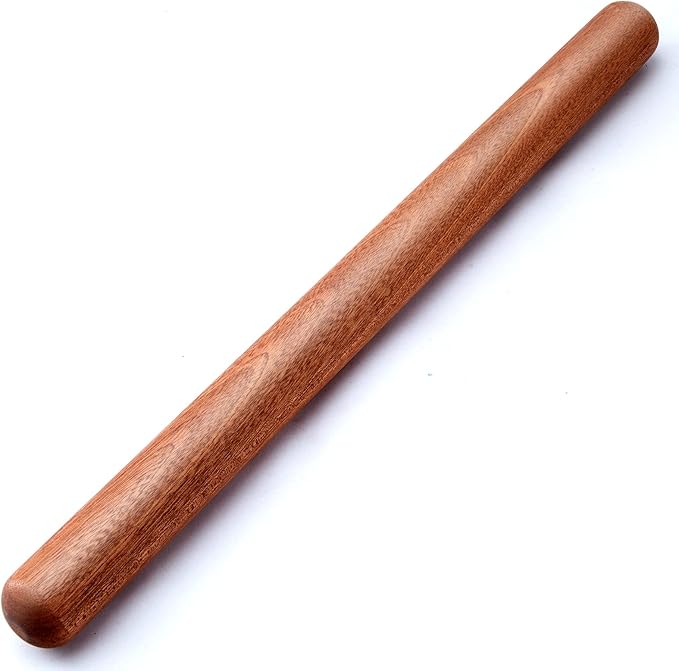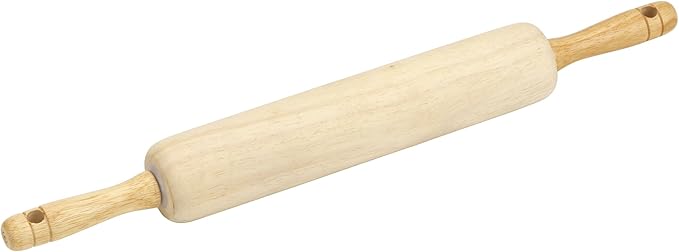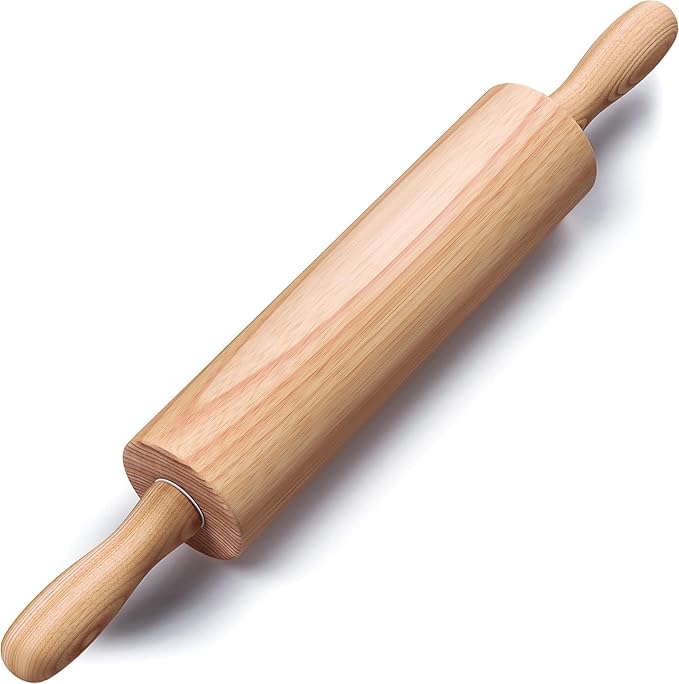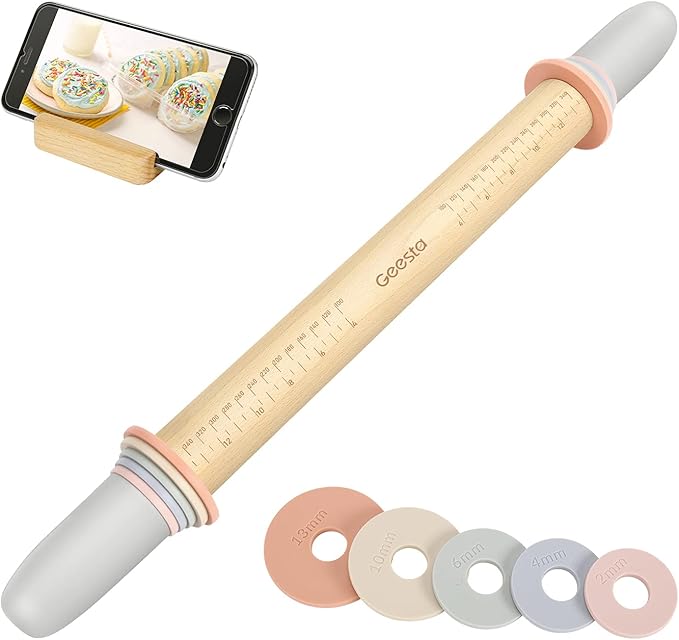The Best Rolling Pin for Every Baker: Top 5 Reviewed
Every passionate home baker knows that the right tools can make all the difference between a good bake and a truly great one. Among the essential kitchen gadgets, a reliable **Rolling Pin** stands out as a fundamental instrument. Whether you’re a seasoned pastry chef or just starting your baking journey, having a rolling pin that feels good in your hands, rolls dough evenly, and stands the test of time is crucial for perfect pie crusts, flaky cookies, and delicate pasta sheets. But with so many options available – from traditional wooden designs to modern nonstick and adjustable models – how do you choose the best one for your needs?
Navigating the world of kitchen tools can be overwhelming, especially when each product promises to be the “best.” That’s why we’ve meticulously tested and reviewed five of the top rolling pins on the market today. Our goal is to cut through the clutter and provide you with an expert, user-friendly guide to help you find your ideal rolling companion. We’ll dive deep into the features, pros, and cons of each, ensuring you make an informed decision that elevates your baking experience.
Join us as we roll out the details on these top contenders, from classic French styles to innovative adjustable designs, helping you achieve consistently perfect dough every single time.
Comparison Table: Top Rolling Pins
| Product Name |
Key Features |
Rating |
Buy Now |
| Aisoso French Rolling Pin |
Tapered design, natural wood, excellent control |
⭐⭐⭐⭐⭐ |
🛒 Buy Now |
| GoodCook Everyday Rolling Pin |
Classic handled design, smooth rolling, durable wood |
⭐⭐⭐⭐ |
🛒 Buy Now |
| AllPurpose 17.6 Inch Beech Rolling Pin |
Extra-long, sturdy beech wood, ideal for large doughs |
⭐⭐⭐⭐⭐ |
🛒 Buy Now |
| Geesta Adjustable Wood Rolling Pin |
Removable thickness rings, precision rolling, engraved measurements |
⭐⭐⭐⭐⭐ |
🛒 Buy Now |
| OXO Good Grips Nonstick Rolling Pin |
Nonstick surface, comfortable handles, easy cleanup |
⭐⭐⭐⭐ |
🛒 Buy Now |
Detailed Reviews
1. Aisoso French Rolling Pin
The Aisoso French Rolling Pin offers a classic, handle-free design that is beloved by professional bakers for its superior control and sensitivity. Crafted from natural, high-quality wood, this rolling pin is tapered at both ends, allowing for a more intuitive feel of the dough’s thickness and consistency. Its smooth, non-porous surface helps prevent dough from sticking, provided you flour it lightly. This design allows you to use the palm of your hands to guide the pin, exerting pressure exactly where it’s needed, which is particularly beneficial for delicate pastry work or achieving ultra-thin edges on pie crusts.
Key Features:
- Elegant tapered design for enhanced control
- Made from durable, natural wood with a smooth finish
- Handle-free for direct hand-to-dough contact
- Lightweight yet sturdy construction
- Easy to clean and maintain with proper care
Pros:
- Provides exceptional control and feel for dough thickness
- Ideal for delicate pastries, pie crusts, and tart shells
- Ergonomic design reduces wrist strain
- Beautiful, minimalist aesthetic
- Simple to clean and store
Cons:
- No handles might be a learning curve for beginners
- Less leverage for very stiff or cold doughs
- Requires regular oiling to prevent drying and cracking
Best For: Professional bakers, pastry enthusiasts, and anyone looking for precise control over dough thickness for delicate tasks like puff pastry, tart doughs, or intricate cookie designs. It’s also great for those who appreciate the tactile experience of baking.
Core Features:
- Solid, single-piece wooden construction
- Gradually tapered ends for precise manipulation
- Smooth, natural wood surface
🛒 Buy Now
2. GoodCook Everyday Rolling Pin
The GoodCook Everyday Rolling Pin is a quintessential example of the traditional handled rolling pin, a staple in many home kitchens. Its classic design features a rotating barrel with comfortable handles on either side, providing excellent leverage and making it easy to roll out various types of dough. Made from durable hardwood, this rolling pin is built for everyday use, handling everything from cookie dough to pizza crusts with ease. The smooth wooden surface glides effortlessly over floured dough, ensuring an even spread and consistent thickness. It’s a no-frills, reliable tool that gets the job done without fuss, making it perfect for bakers of all skill levels.
Key Features:
- Traditional design with ergonomic handles
- Smooth-gliding rotating barrel for effortless rolling
- Constructed from durable, natural hardwood
- Generous length for various baking projects
- Easy to clean and maintain
Pros:
- Very user-friendly, especially for beginners
- Provides good leverage for tougher doughs
- Versatile for a wide range of baking tasks
- Affordable and widely available
- Comfortable grip prevents hand fatigue
Cons:
- Less direct control over dough thickness compared to French pins
- Handles can sometimes become loose over time with heavy use
- Can be bulkier to store than handle-less options
Best For: Home bakers who prefer the traditional handled style, beginners seeking an easy-to-use and versatile tool, and anyone needing a reliable, everyday rolling pin for general baking, such as cookies, bread, and basic pie crusts.
Core Features:
- Classic rotating barrel design
- Sturdy hardwood construction
- Comfort-grip handles
🛒 Buy Now
3. AllPurpose 17.6 Inch Beech Rolling Pin
When it comes to tackling larger baking projects, the AllPurpose 17.6 Inch Beech Rolling Pin truly shines. This robust and extra-long rolling pin is crafted from solid beech wood, known for its density and durability. Its substantial length allows you to roll out expansive sheets of dough—perfect for large batches of cookies, pizza, or homemade pasta—with fewer passes and more consistent results. The smooth, well-finished surface of the beech wood ensures that dough doesn’t stick readily, and its weight provides a natural advantage in flattening dough evenly. This is a workhorse rolling pin designed for serious bakers who frequently work with considerable amounts of dough.
Key Features:
- Extra-long 17.6-inch barrel for wide coverage
- Made from high-quality, durable beech wood
- Smooth, polished surface for non-stick performance
- Sturdy construction for heavy-duty use
- Classic handled design for comfort and leverage
Pros:
- Excellent for large doughs, pizza, and pasta sheets
- Durable and robust, built to last
- Weight aids in flattening dough evenly
- Comfortable handles provide good grip and control
- Reduces rolling time for bigger projects
Cons:
- Can be bulky and require more storage space
- Heavier than many other rolling pin types
- May be overkill for small, everyday baking tasks
Best For: Avid bakers, those who frequently make large batches of dough, pizza enthusiasts, and anyone needing a heavy-duty, long-reaching rolling pin for substantial baking projects. It’s a fantastic choice for professional home cooks.
Core Features:
- Extended barrel length for maximum dough coverage
- Premium, dense beech wood construction
- Traditional rotating barrel with handles
🛒 Buy Now
4. Geesta Adjustable Wood Rolling Pin
For bakers who crave precision and consistency, the Geesta Adjustable Wood Rolling Pin is a game-changer. This innovative rolling pin comes equipped with removable, color-coded rings that allow you to roll dough to exact, uniform thicknesses (typically 2mm, 4mm, 6mm, and 10mm). No more guessing or uneven crusts! Crafted from high-quality beech wood, it features a smooth surface and engraved measurement guides along the barrel, adding another layer of accuracy to your baking. This adjustable design takes the guesswork out of achieving perfect dough thickness, making it an invaluable tool for recipes that demand exact dimensions, such as sugar cookies, fondant, or pasta.
Key Features:
- Removable, color-coded rings for adjustable dough thickness
- Premium beech wood construction with a smooth finish
- Engraved measurement markings on the barrel
- Solid core for stability and durability
- Versatile for a wide range of recipes
Pros:
- Ensures perfectly even dough thickness every time
- Eliminates the need for external guides or rulers
- Ideal for consistent cookies, pie crusts, and pasta
- Durable wood construction for longevity
- Easy to switch between desired thicknesses
Cons:
- Rings can be misplaced or tricky to store
- Cleaning around the rings might require extra attention
- Slightly heavier due to the robust construction and rings
Best For: Precision bakers, those who make a lot of cookies, pies, or pasta where consistent thickness is paramount, and anyone who wants to eliminate guesswork from their rolling process. It’s an excellent tool for achieving professional-looking results at home.
Core Features:
- Interchangeable thickness guide rings
- Solid beech wood barrel with measurement guides
- Traditional handled design for comfortable use
🛒 Buy Now
5. OXO Good Grips Nonstick Rolling Pin
The OXO Good Grips Nonstick Rolling Pin brings modern convenience to a classic kitchen tool. Known for their thoughtful design and ergonomic features, OXO delivers a rolling pin with a nonstick surface that virtually eliminates dough sticking, reducing the need for excessive flouring. This means less mess and more efficient rolling, especially for sticky doughs like those for cinnamon rolls or certain cookies. The signature OXO soft, comfortable handles provide an excellent grip, even with wet or flour-dusted hands, and the internal steel axle ensures smooth, consistent rolling. It’s a practical and efficient choice for everyday baking, prioritizing ease of use and cleanup.
Key Features:
- Durable nonstick surface prevents dough from sticking
- Ergonomic “Good Grips” handles for comfort and control
- Internal steel axle for smooth, fluid rolling
- Easy to clean with a quick wipe down
- Generous barrel length suitable for most baking tasks
Pros:
- Excellent for sticky doughs, minimizing flour usage
- Comfortable, non-slip handles reduce hand fatigue
- Very easy to clean, often just requires wiping
- Durable construction designed for frequent use
- Provides consistent results with less effort
Cons:
- Nonstick coating can be scratched if not handled with care
- Less aesthetically traditional than solid wood pins
- Can be pricier than basic wooden models
Best For: Bakers who frequently work with sticky doughs, those who prioritize easy cleanup, and individuals seeking a comfortable, non-slip grip for extended baking sessions. It’s a fantastic all-rounder for the modern kitchen.
Core Features:
- Nonstick barrel material
- Ergonomic, soft-grip handles
- Smooth-gliding internal mechanism
🛒 Buy Now
Buying Guide: Choosing Your Perfect Rolling Pin
Selecting the right rolling pin can significantly impact your baking success. Consider these factors before making your purchase:
Type of Rolling Pin
There are generally three main types:
- French Rolling Pins: Tapered, handle-less design offering maximum control and feel for the dough. Excellent for delicate tasks and experienced bakers.
- Traditional (American) Rolling Pins: Feature a rotating barrel with handles. Easy to use, provide good leverage, and are versatile for most baking needs.
- Adjustable Rolling Pins: Come with removable rings or spacers to achieve precise, consistent dough thickness. Ideal for recipes requiring exact dimensions.
Material
The material affects performance, weight, and maintenance.
- Wood: Classic choice (maple, beech, birch). Offers a natural feel, good weight, and can be durable. Requires occasional oiling.
- Silicone/Nonstick: Great for sticky doughs, easy to clean, and often lighter. Be careful not to scratch the surface.
- Stainless Steel: Can be chilled to keep dough cool, very durable, and hygienic. Can be heavy and potentially stick if not floured.
- Marble: Naturally cool, heavy, and elegant. Excellent for pastry, but very heavy and can be brittle.
Size and Weight
Consider your counter space, storage, and the types of dough you typically roll. Longer pins are great for large doughs (like pizza or pasta), while shorter, lighter pins are perfect for smaller, delicate tasks. Heavier pins can help with tougher doughs, while lighter ones offer more finesse.
Handles vs. Handle-less
This is a personal preference. Handles offer leverage and a comfortable grip for many, reducing wrist strain. Handle-less (French) pins provide direct control and a better “feel” for the dough, which can be preferred by experienced bakers for precision work.
Maintenance and Cleaning
Wooden pins require hand washing and occasional oiling. Nonstick and stainless steel pins are generally easier to clean, often just needing a wipe or a quick wash with soap and water. Always check manufacturer instructions.
By considering these factors, you can choose a rolling pin that not only meets your practical needs but also enhances your joy in baking.
Frequently Asked Questions (FAQ)
Q1: What’s the best way to clean a wooden rolling pin?
A: Wooden rolling pins should be hand-washed with warm water and a mild soap, then thoroughly dried immediately. Avoid soaking them, as this can cause cracking or warping. Periodically, you can rub them with food-grade mineral oil to prevent drying and maintain their finish.
Q2: How do I prevent dough from sticking to my rolling pin?
A: Lightly flour your work surface and the rolling pin itself before rolling. You can also lightly flour the dough. For very sticky doughs, a nonstick rolling pin (like the OXO) or chilling the dough beforehand can be very helpful.
Q3: Are adjustable rolling pins worth it?
A: Absolutely, especially if you value precision and consistency. They eliminate guesswork and ensure uniform dough thickness, which is crucial for recipes like sugar cookies, pizza, or pastries where even baking is key. They are a great investment for serious home bakers.
Q4: French or traditional rolling pin – which is better for beginners?
A: For beginners, a traditional rolling pin with handles (like the GoodCook Everyday) is often easier to start with due to the leverage and familiar grip. However, French pins offer more direct control and can be quickly mastered with a little practice, providing a more intuitive feel for the dough.
Q5: Can I use a rolling pin for things other than dough?
A: Yes! Rolling pins are versatile. You can use them to crush crackers or cookies for crusts, grind nuts, or even tenderize meat (though a meat mallet is usually better for that). Just ensure it’s clean and suitable for the task.
Conclusion: Our Top Picks
Choosing the ultimate rolling pin depends heavily on your personal baking style and needs. However, after extensive review, we can confidently recommend some standout options:
* **Best Overall: Aisoso French Rolling Pin.** Its unparalleled control, elegant design, and ability to tackle delicate pastries with precision make it a favorite among serious bakers. While it has a slight learning curve, the rewards in baking quality are immense.
* **Best Budget: GoodCook Everyday Rolling Pin.** For those seeking a reliable, no-frills rolling pin that performs well for daily baking tasks without breaking the bank, this traditional handled option is an excellent choice. It’s a foundational tool for any kitchen.
* **Best Premium/Precision: Geesta Adjustable Wood Rolling Pin.** If consistency and exact dough thickness are paramount to your baking, the Geesta adjustable pin is worth every penny. Its innovative ring system and quality construction ensure perfect results every time, elevating your baking to a professional level.
No matter which rolling pin you choose, investing in a quality tool will undoubtedly enhance your baking adventures. Happy rolling!




